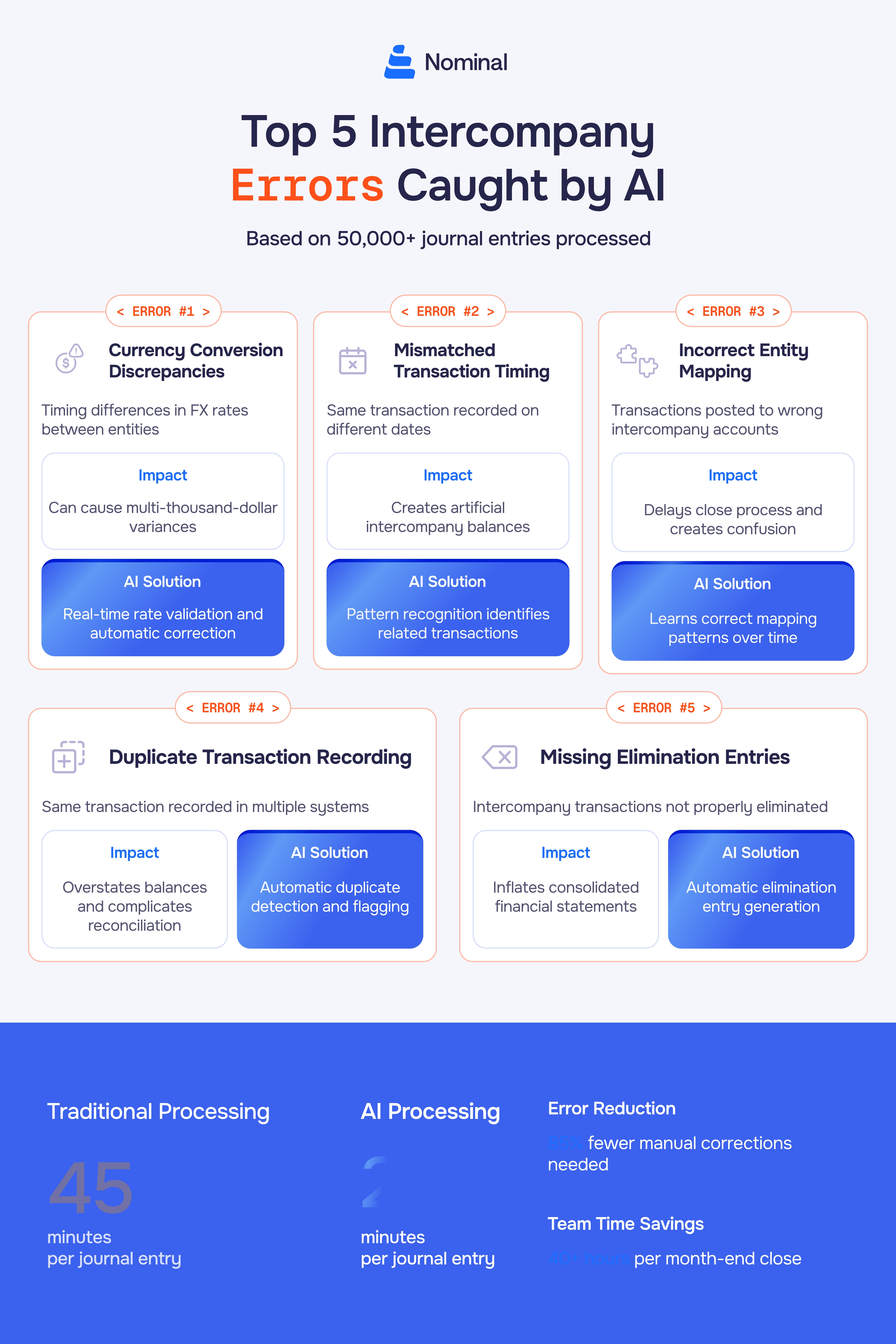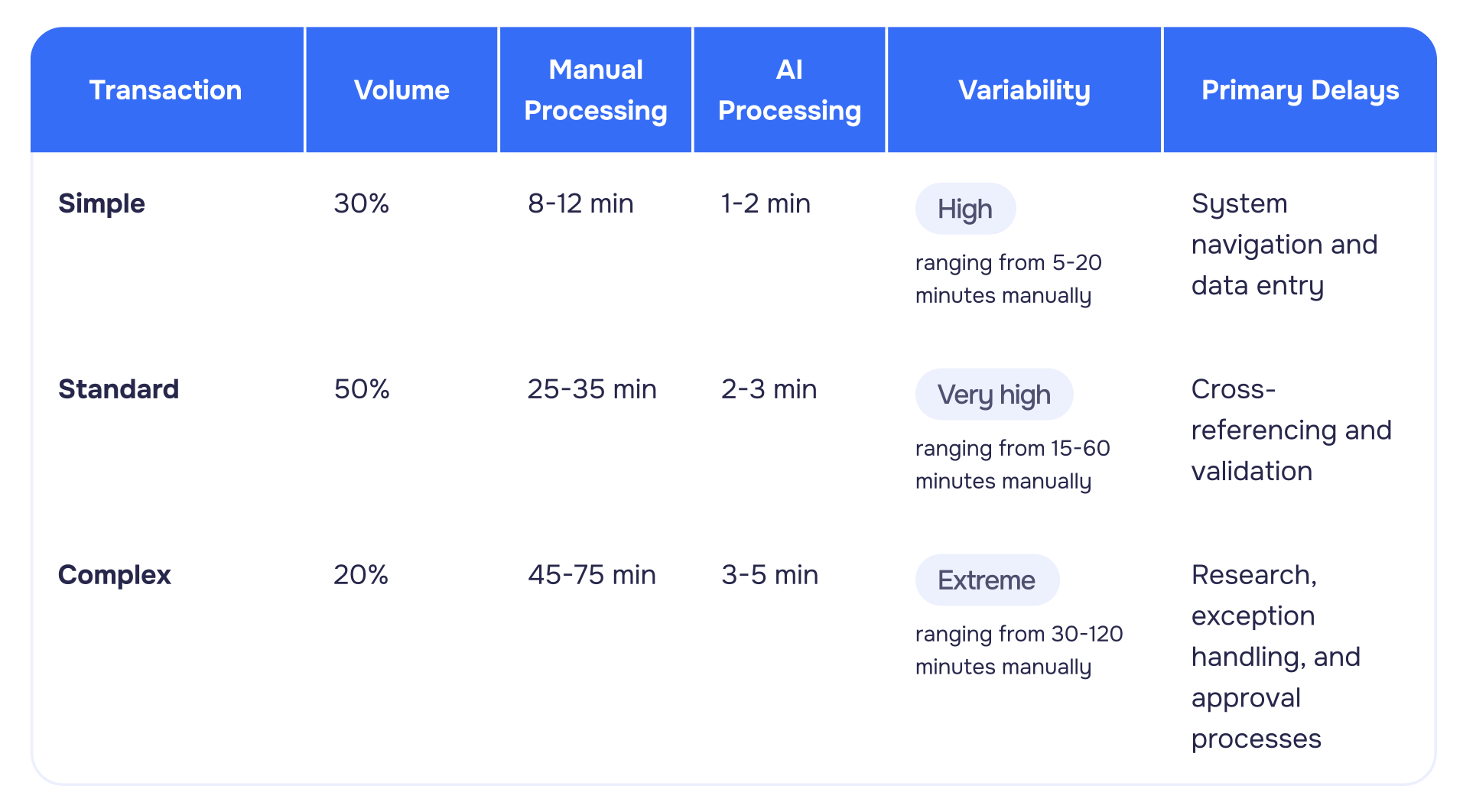
Research from Nominal analyzing 50,247,000 journal entries from 12 mid-market companies reveals that 89% of finance errors follow just 12 predictable patterns, with AI processing averaging 43 minutes faster per transaction than manual methods.
The finance scaling dilemma feels impossible to solve. Revenue grows 40%, complexity doubles, but your headcount budget stays flat. The conventional response is to work longer hours or push for more hires. But what if there's a third option that most finance leaders are missing?
Nominal’s analysis of 50,247,000 real journal entries from 12 mid-market companies uncovers the hidden patterns preventing finance teams from growing efficiently: scaling finance operations isn't about working harder or hiring more people. It's about working predictably.
This comprehensive analysis, covering six months of operational data from companies ranging from $50M to $500M in revenue, shows exactly where finance teams get stuck and, more importantly, the proven path to break free.
This isn't theoretical advice from consultants. These insights come from actual transaction data, real processing times, and measurable results from finance teams that successfully scaled without adding headcount.
We recently shared these findings in our webinar "Scaling Finance Operations Without Adding Headcount”. Here's what the numbers reveal about transforming your finance operations.
The Scaling Finance Operations Paradox That's Holding Teams Back
The contradiction is evident in the numbers. While 58% of finance leaders identify manual effort as their biggest bottleneck to scaling operations, 50% still rely on manual Excel processes for consolidation.
This disconnect reveals a fundamental challenge that extends beyond simple technology adoption. Teams recognize the problem but remain trapped in manual workflows that consume increasingly more resources as complexity grows. The underlying issue is cyclical: organizations overwhelmed by manual processes lack the bandwidth to implement automation, creating an operational paradox that prevents sustainable growth.
The research reveals specific organizational characteristics that distinguish teams successfully breaking free from this cycle. Companies that overcome the manual work trap share common implementation approaches, resource allocation strategies, and change management practices that enable transformation without operational disruption.
89% of Finance Errors Follow Predictable Patterns
The study uncovered something remarkable: the vast majority of finance errors aren't random. They follow specific, predictable patterns that occur month after month.
The Most Common Error Categories Include:
- Currency conversion timing differences
- Transaction timing mismatches
- Entity mapping errors
- Duplicate transaction recording
- Missing elimination entries

One company in the study focused on automating just duplicate detection and saved 15 hours per month; nearly half an FTE from addressing a single error pattern. The complete analysis reveals all 12 patterns and their relative frequency, providing a systematic approach to error prevention that can be implemented incrementally.
You might also like: Transaction Matching: How Modern Finance Teams Automate Accuracy
Understanding Error Pattern Hierarchies
The research identifies not just which errors occur most frequently, but which ones create the most downstream impact on operations. Some patterns, while less common, trigger cascading effects that consume disproportionate resources during resolution. Others appear simple but mask underlying process inefficiencies that automation can expose and eliminate.
The data reveals specific error characteristics that make certain patterns ideal automation candidates, while others require hybrid approaches combining AI detection with human oversight. This nuanced understanding enables organizations to prioritize implementations based on maximum operational impact rather than simple frequency counts.
The Hidden Cost of Processing Time Variability
The second major finding revealed something most finance teams don't realize is happening. Manual processing times vary dramatically. The same transaction might take anywhere from 5 minutes to 120 minutes depending on complexity, who processes it, and when.
Processing Time Analysis:

Meanwhile, AI processing delivers consistent turnaround times regardless of transaction complexity or volume. On average, manual processing takes 43 minutes longer per entry than AI processing.
This variability is silently killing productivity. The average finance team processes 50-80 transactions daily, which means:
- Manual approach: 25-40 hours of processing time per day
- AI approach: 3-5 hours of oversight time per day
- Time savings: 20-35 hours per day
Organizations should track one week of actual time spent on reconciliation and journal entries. The results typically provide compelling data and the business case for automation investment.
The Elite 8%: What Fast-Closing Companies Do Differently
The data reveals a stark reality about operational efficiency: only 8% of companies achieve month-end close in under five days, while 25% take more than 20 days. This means a quarter of organizations don't understand their financial performance until three weeks after month-end, creating significant competitive disadvantages in fast-moving markets.
The elite performers share one critical characteristic that sets them apart from the majority, but the implications extend far beyond simple speed metrics. Fast-closing companies demonstrate superior cash flow management, more accurate forecasting capabilities, and enhanced ability to respond quickly to market changes.
The Cascading Benefits of Operational Speed
The numbers reveals that organizations achieving rapid closes don't just save time; they fundamentally transform their strategic capabilities. Fast closes enable real-time business insights, more accurate quarterly projections, and enhanced credibility with stakeholders including investors, lenders, and board members.
These operational advantages compound over time, creating sustainable competitive differentiation that becomes increasingly difficult for slower-closing competitors to match. The complete study details exactly which processes these high-performing companies automated first and the specific implementation sequence that delivers maximum impact with minimal disruption.
Organizations currently taking 15-20 days to close can realistically achieve 5-7 day closes within 6-12 months by following the proven methodologies documented in the report. The analysis includes detailed implementation timelines, resource requirements, and change management frameworks that enable successful transformation.
Download the complete analysis to access the detailed methodology, full error pattern breakdown, and implementation framework that guided these insights. Get the full report here.
How AI Agents Handle Predictable Error Patterns
Instead of generic automation, modern AI agents can be trained to handle specific error patterns with remarkable precision.
Here's how it works in practice, the Intercompany Reconciliation Agent will:
- Check if transactions were made within defined date windows
- Verify if amounts fall within acceptable variance thresholds
- Match customer dimensions using memo fields
- Assess matching confidence and flags discrepancies
When the agent identifies a $250 discrepancy due to a freight damage claim, it doesn't just alert the team. It explains the issue, references supporting documentation, and can create the necessary adjustment entry with one click.
This represents the fundamental shift in scaling finance operations: from 75 minutes of manual investigation down to 2-3 minutes of oversight.
Teams Transform Rather Than Shrink
Automation transforms finance roles rather than eliminating them. The report tracks how time allocation shifts from transaction processing to strategic analysis, with 40% of team members taking on expanded responsibilities within 12 months.
There are specific metrics on role evolution, promotion rates, and job satisfaction improvements that provide compelling evidence for automation's positive impact on career development. More importantly, the analysis tracks how skill requirements evolve and which competencies become most valuable in automated environments.
Strategic Skill Development in Automated Finance
The transformation extends beyond task reallocation to fundamental skill development. Finance professionals in automated environments develop enhanced analytical capabilities, stronger business partnership skills, and deeper expertise in data interpretation and strategic planning.
Organizations implementing automation report that team members become more engaged and productive as they transition from repetitive transaction processing to value-added analysis and strategic support. The research documents specific training approaches and development programs that accelerate this transition while maintaining operational continuity.
This evolution creates more satisfying career paths while simultaneously improving business outcomes. Finance teams become true business partners rather than transaction processors, contributing directly to strategic decision-making and organizational growth.
Compounding ROI That Exceeds Expectations
The financial returns from automation compound over time. Organizations typically see 200-300 hours saved in month one, increasing to 400-700 hours by month six as AI learns specific operational patterns.
Companies report monthly savings ranging from $40,000 to $70,000 with payback periods of 1.5 to 3 months.
The Proven Roadmap for Success
Based on analyzing 50+ million transactions, the research identifies a four-phase approach that consistently delivers results:
- Measure Current State: Specific metrics to track and baseline establishment
- Start with Consolidation: Why this delivers the highest immediate impact
- Automate Top Error Patterns: Systematic approach to error prevention
- Redeploy Teams Strategically: Role evolution planning and execution
Each phase includes detailed implementation guidance, success metrics, and common pitfalls to avoid.
Transform Finance Operations Today
The data reveals that 92% of finance leaders believe AI will become standard in accounting within three years, yet only 8% currently have automated consolidation processes. This gap represents both an opportunity and a risk.
Early adopters are building operational advantages that will be difficult for competitors to replicate. Organizations that delay implementation may find themselves at a significant disadvantage as automation becomes the industry standard.
Ready to see how this works for your specific consolidation challenges? Our AI agents can analyze your transaction patterns and show you exactly where automation will deliver the biggest impact.
Book a personalized demo to discover your path to scaling finance operations without adding headcount.






